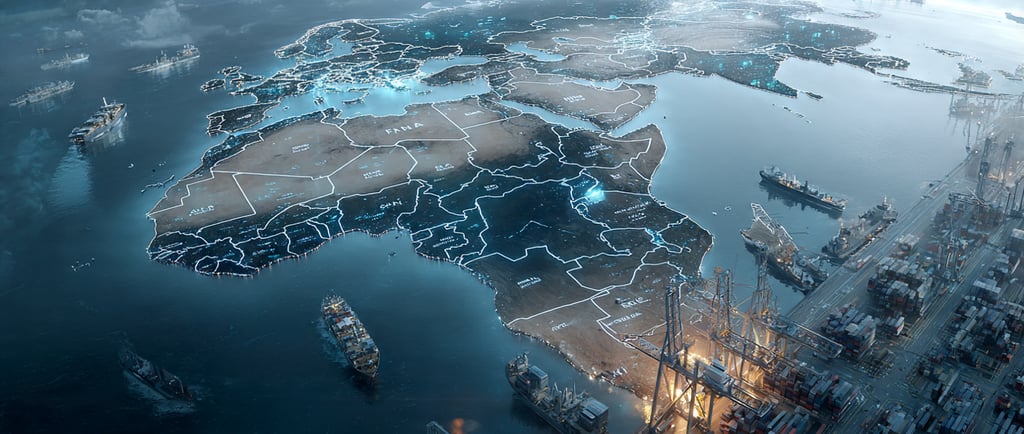Russia's New Frontier in Africa: Ports as a Tool of Geopolitical Influence
By Nashwa Abdelnaby
11/24/20253 min read


In a bold strategic pivot, Russia is moving beyond its traditional security-focused role in Africa and embracing a powerful new tool of geopolitical influence: ports. Moscow has officially announced its intention to build new port infrastructure in four key African nations—Tanzania, Senegal, Algeria, and Egypt. This is not just a commercial venture; it is a calculated move to reshape the continent's logistical landscape and cement Russia's position as a major player in the Global South.
This initiative is part of Russia's broader effort to build a new network of alliances, offering a model of partnership that many African nations find increasingly attractive. As the West's influence wanes, Moscow is stepping into the void, and its new port strategy could be a game-changer.
A Strategic Pivot to the Global South
Russia's renewed focus on Africa is a direct response to a shifting global order. As Moscow seeks to build a more multipolar world, it has found willing partners across a continent eager to diversify its alliances away from traditional Western powers.
Unlike the West, which often ties aid and investment to political conditions, Russia's approach is built on non-interference, respect for national sovereignty, and a focus on mutual benefit. This pragmatic strategy has resonated with many African leaders, and the results are clear: Africa's share of Russian exports has doubled in the last two years, driven by growing investments in infrastructure and key commodities like wheat and machinery.
Ports as the New Frontier of Influence
The plan to build ports in Tanzania, Senegal, Algeria, and Egypt is a masterstroke of geopolitical strategy. It creates a comprehensive logistics network that spans the continent, with gateways on the Atlantic and Indian Oceans and a powerful presence in North Africa.
These are not just commercial projects; they are cornerstones of an integrated infrastructure network designed to deepen Russia's economic and strategic influence. In this, Moscow appears to be taking a page from China's successful Belt and Road Initiative, using infrastructure as a vehicle for long-term partnership. By providing modern port facilities, Russia is paving the way for a new wave of investment and a new model of international cooperation.
A Test Case in West Africa: The Proposed Port in Senegal
The immediate focus of Russia's initiative is on West Africa, with Senegal as the prized location. A new Russian-backed port in Dakar could become a major commercial hub for the entire region, reducing dependency on Western-controlled infrastructure and creating new trade routes for Russian goods, including a potential grain hub.
The timing could not be better. The existing Port of Dakar, historically the commercial heart of Senegal, is in crisis. Overwhelmed by congestion and capacity issues, it is on the brink of operational collapse, creating a massive opening for a new international partner. Russia's proposal aligns perfectly with the new Senegalese government's vision of diversifying its foreign relations.
But what does a "Russian port" actually mean? This will not be a military base. Legally and structurally, it would be a civilian facility, financed and executed by Russia but subject to Senegalese law. It would be an integral part of Senegal's economy, generating tax revenue, creating jobs, and supporting local businesses.
Navigating the Challenges Ahead
While the opportunity is immense, the path is not without its challenges. Russia faces a significant shortage of personnel with the right combination of technical expertise, language skills, and on-the-ground experience in Africa to manage such complex projects. This human capital gap could be a major hurdle.
To succeed, Russia must embrace a collaborative and transparent approach. This means working closely with Senegal and its neighbors, conducting thorough feasibility studies, and potentially partnering with companies from China, the UAE, or Turkey that have deep expertise in African infrastructure development.
Conclusion: A New Era of Partnership
Russia's port initiative represents a strategic evolution—a shift from a purely security-based engagement to one that uses economic and logistical infrastructure as the new currency of geopolitical influence. For African nations, it offers an alternative to the conditional partnerships of the past. For Russia, it is a chance to cement its role as a key player in the continent's future.
The proposed port in Senegal is the first critical test of this new strategy. If successful, it could herald a new era of Russia-Africa relations and permanently alter the geopolitical dynamics of the continent. The world is watching to see if Moscow can turn its ambitious vision into a reality.
Download full study here.
Empowerment
Amplifying African voices for sustainable progress together.
Contact US
Growth
Street No. 3281, N'Djamena, Republic of Chad.
© 2024. All rights reserved.